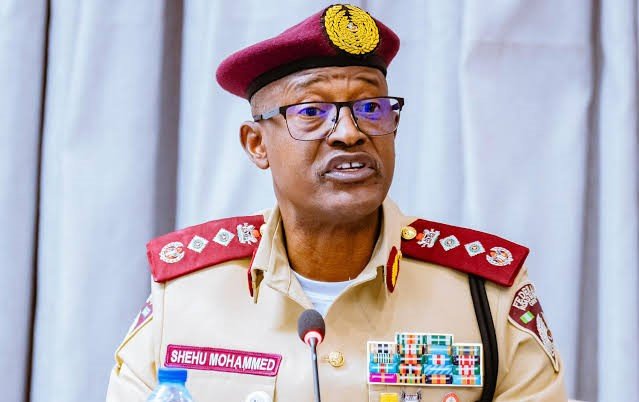CORPS Marshal of the Federal Road Safety Corps (FRSC), Shehu Mohammed, has said that arming road safety officials may be the only way to enforce traffic laws effectively on Nigeria’s increasingly lawless highways.
Speaking on Arise News Television on Thursday monitored by News Point Nigeria, the FRSC boss painted a stark picture of the challenges his officers face when confronting heavy-duty trucks, tankers, and overloaded trailers.
“How do you stop a trailer or a tanker on the road? How do you just do that? It’s very, very difficult,” Mohammed said.
“A truck, especially one with probably 100 passengers on top, with animals, and you only have four personnel as a patrol team, how do you stop that?”
He argued that without adequate “power of cohesion,” FRSC personnel are often left helpless in the face of gross violations.
“If you don’t have the power to enforce anything, there’s no way you can achieve that enforcement,” he maintained.
Mohammed also addressed recurring allegations of bribery and extortion by some operatives, which frequently spark outrage on social media.
He admitted the problem exists but insisted the FRSC has been tougher than most agencies in disciplining erring staff.
“We have more record of termination and dismissal of our personnel because of bribe and corruption,” he said, noting that the Corps enforces a strict standard operating procedure to check misconduct.
On public complaints about inflated driver’s licence costs, the FRSC boss restated the official fees:
₦15,000 for a three-year licence
₦21,000 for a five-year licence
“It’s still the same figure, the same amount,” he said, apologising to Nigerians for the stress of licence processing.
Mohammed promised that a new enhanced driver’s licence system would roll out by early October, improving efficiency and service delivery.
The debate over arming road safety officers is not new. In October 2024, the House of Representatives passed a bill at second reading to establish an Armed Road Safety Corps, a specialised squad within FRSC empowered to carry weapons and enforce traffic laws more robustly.
The proposal was born out of growing concerns over:
Reckless driving on highways
Frequent road accidents and fatalities
The inability of unarmed officers to stop dangerous drivers
However, public opposition has been fierce. A PUNCH Online survey in 2024 revealed that over 90% of Nigerians rejected the idea, with transport unions and civic groups warning that armed road safety personnel could worsen extortion, intimidation, and abuse of power.
While critics warn against the militarisation of road policing, proponents argue that without proper enforcement tools, the FRSC remains toothless in curbing reckless road users.
For his part, Mohammed insists the Corps will continue to seek tools and reforms that will enable it to deliver on its mandate.
“Road safety will continue to deliver its mandate as enshrined in the FRSC Act,” he said.







